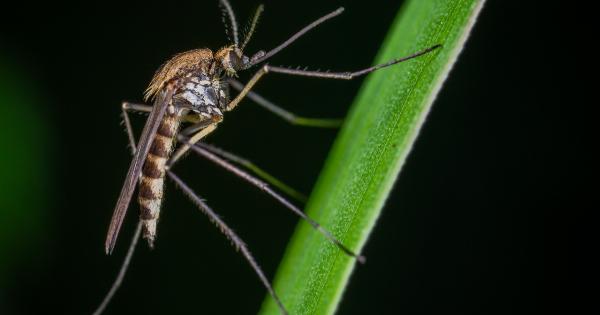Mosquitoes can be a nuisance, especially during the warmer months. Their itchy bites can ruin outdoor gatherings and make it difficult to enjoy your backyard.
While there are many mosquito repellents available on the market, some people prefer natural alternatives. One effective and eco-friendly way to keep mosquitoes at bay is by incorporating specific plants into your garden or patio. In this article, we will explore seven plants that are known for their mosquito-repelling properties.
1. Citronella
Citronella is perhaps the most well-known plant when it comes to repelling mosquitoes. Its distinct lemony scent masks other odors that attract mosquitoes. You can plant citronella in pots or directly in your garden.
Make sure to place it near outdoor seating areas to maximize its effectiveness in keeping mosquitoes away.
2. Lavender
Lavender is beloved for its beautiful flowers and calming scent. However, mosquitoes are not fans of this fragrant plant. Planting lavender in your garden or placing dried lavender around your patio can help keep mosquitoes at bay.
Additionally, lavender is known to attract pollinators like bees and butterflies, making it a beneficial addition to any outdoor space.
3. Marigolds
Marigolds not only add vibrant colors to your garden but also act as natural mosquito repellants. The strong smell of marigolds repels mosquitoes and other garden pests. You can plant marigolds in flower beds or place them in pots around your patio.
Marigolds are low-maintenance plants, making them an excellent choice for both beginner and seasoned gardeners.
4. Basil
Basil is a versatile herb that can be used in various culinary dishes. However, mosquitoes find its smell quite offensive. Planting basil in your garden or keeping potted basil on your patio can help deter mosquitoes.
You can also crush basil leaves and rub them on your skin for added protection against mosquito bites.
5. Rosemary
Rosemary is a popular herb known for its woody fragrance and culinary uses. It also has mosquito-repelling properties. Plant rosemary in your garden or keep potted rosemary on your patio to enjoy its fragrance while keeping mosquitoes away.
Rosemary is a resilient plant that thrives in various climates, making it a fantastic choice for mosquito control.
6. Catnip
While catnip may attract cats, it repels mosquitoes. The essential oil found in catnip, called nepetalactone, acts as a natural mosquito repellent. Plant catnip in your garden or crush the leaves and rub them on your skin to keep mosquitoes at bay.
Remember to keep catnip away from areas frequented by your feline friends, as it may induce lively behavior in them.
7. Peppermint
Peppermint is a refreshing herb with a strong scent that mosquitoes dislike. By planting peppermint in your garden or patio, you can naturally repel these pesky insects.
Additionally, the cooling sensation of peppermint provides relief if you do suffer from mosquito bites. Be mindful that peppermint can spread quickly, so it’s best to plant it in pots or dedicated garden beds.
Incorporating Mosquito-Repelling Plants Into Your Space
When it comes to planting mosquito-repelling plants, proper placement is essential for optimum effectiveness. Here are some tips to follow:.
1. Identify Mosquito Hotspots
Take note of areas in your garden or patio where mosquitoes tend to be most active. These may include areas with stagnant water, lush vegetation, or shaded spots.
Identifying these hotspots will help you determine the best locations for planting mosquito-repelling plants.
2. Create a Barrier
Strategically place mosquito-repelling plants near seating areas or entrances to create a natural barrier against mosquitoes. This will reduce their ability to enter and bother you and your guests.
3. Consider Companion Planting
Companion planting is the practice of planting different plants together to enhance growth or repel pests. Consider incorporating mosquito-repellent plants with others that complement their growth and function.
For example, planting basil near tomatoes can enhance both plants’ growth while protecting the tomatoes from pests like mosquitoes.
4. Maintain Your Plants
Keep your mosquito-repelling plants healthy and flourishing by providing adequate water, sunlight, and soil conditions. Healthy plants emit stronger scents that effectively repel mosquitoes.
5. Combine With Other Mosquito Control Measures
While mosquito-repelling plants can significantly reduce mosquito populations in your outdoor space, it’s essential to combine their use with other preventive measures.
Remove any standing water sources, use mosquito nets or screens, and consider using natural insect repellents to further protect yourself from mosquito bites.
Conclusion
By incorporating mosquito-repelling plants into your garden or patio, you can naturally and aesthetically combat mosquito problems.
Citronella, lavender, marigolds, basil, rosemary, catnip, and peppermint are just a few plants that can help keep mosquitoes at bay while adding beauty and fragrance to your outdoor space. Remember to identify mosquito hotspots, create barriers, and maintain your plants for optimal effectiveness. Enjoy mosquito-free evenings and reclaim your outdoor paradise!.





























